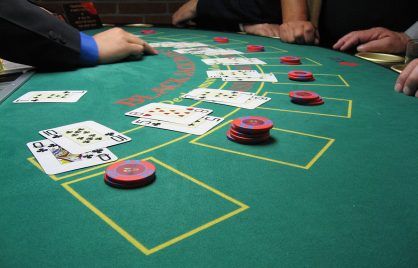We Analyzed Every WSOP Winner Since 2003 To See If A Certain Personality Makes You A Born Champion

It’s safe to say that taking down the Main Event is the dream of almost every amateur and professional poker player out there.
And unlike other sports, there is actually a chance of that dream becoming a reality for anyone. You wouldn’t expect an average Joe to take down the chess Grandmaster tournament, but it could easily happen in poker.
Over the years, the WSOP Main Event has seen the unlikeliest of outcomes. Hardened professionals were often left in the dust and watching the backs of aspiring amateurs driven by hope and desire.
On the surface, these people come from very different backgrounds and have very different life stories and paths that led them to the coveted final table.
But are there some common traits that all these winners share, or is it really anyone’s game?
That’s what we set out to discover in this article.
Looking at WSOP winners over the years, I’ll try to discover if there are certain qualities that a majority of these people share and if there are certain personality traits that make one likelier to triumph on poker’s largest stage.
From 2003-2020, we’ll look at the Main Event winner from each year to see if there are any patterns.
- 2003 – Chris Moneymaker
- 2004 – Greg Raymer
- 2005 – Joe Hachem
- 2006 – Jamie Gold
- 2007 – Jerry Yang
- 2008 – Peter Eastgate
- 2009 – Joe Cada
- 2010 – Jonathan Duhamel
- 2011 – Pius Heinz
- 2012 – Greg Merson
- 2013 – Ryan Riess
- 2014 – Martin Jacobson
- 2015 – Joe McKeehen
- 2016 – Qui Nguyen
- 2017 – Scott Blumstein
- 2018 – John Cynn
- 2019 – Hossein Ensan
- 2020 – Damian Salas
- Summary: Is There a Common Trait WSOP Champions Share?
2003 – Chris Moneymaker
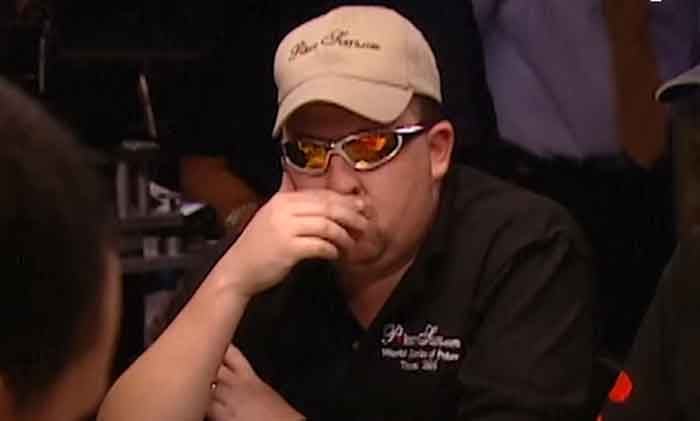
I’ve decided to start this article with the year 2003 because that was the year of the poker boom. It was in 2003 that one Chris Moneymaker, an unknown accountant from Tennessee, went on to do the impossible and capture the Main Event title.
The Moneymaker story is a well-known one, and it’s what helped propel poker into a global phenomenon.
But was there something special about Moneymaker that helped him win?
From a technical point of view, he was definitely an amateur and on a personal level, he wasn’t even all that motivated to play in the Main Event.
He won his entry through a satellite on PokerStars, but he was inches away from throwing away the victory in favor of taking a few grand for finishing “on the bubble”.
It was only at the insistence of his friend who said he’d buy a piece of action to help cover his Las Vegas expenses that Moneymaker decided to go for it.
There was nothing particularly remarkable about his WSOP appearance, either (apart from the crazy run of cards, of course). His table presence wasn’t spectacular in any way.
Still, he managed to take down the 2003 Main Event, defeating none other than Sammy Farha in the final skirmish for the title, forever changing the history of poker.
2004 – Greg Raymer
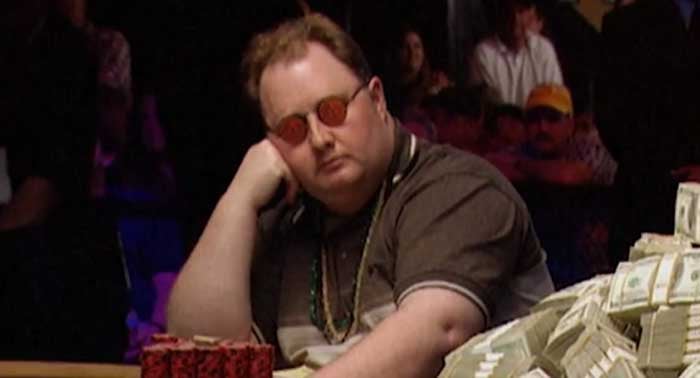
Greg “Fossilman” Raymer took down the 2004 Main Event, earning $5,000,000 for his efforts. Unlike Moneymaker, Raymer was a professional player for the best part of his life.
One similarity between both players is that Greg also won his Main Event seat via a cheap ($160) online satellite.
Named “Fossilman” for his legendary fossil card protectors, Raymer started out as a professional blackjack player. It was only later that he switched to poker, realizing there was more money to be made there.
He was very motivated to make his career as a professional gambler a success as that was his first and only career. The Main Event win, albeit unexpected, was one of the biggest targets he could hope to hit along the way.
As for his personality, Raymer has always had quite a table presence. His weird sunglasses and willingness to engage in the table banter with his opponents made him a fan favorite and a great ambassador for the game after his win.
2005 – Joe Hachem
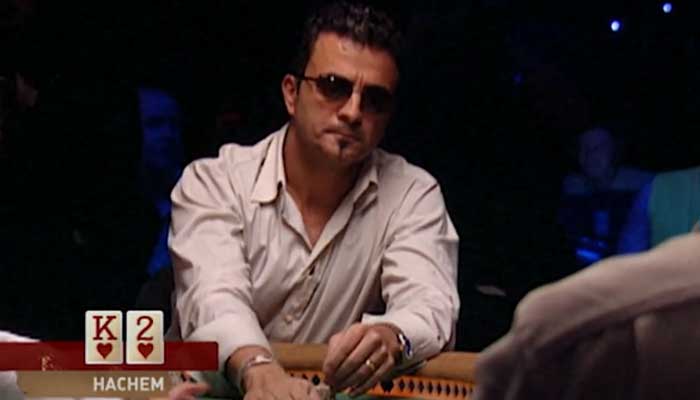
Australia-born Joe Hachem found his way into poker after his initial career as a chiropractor was brought to an abrupt end due to a rare medical condition.
As unfortunate as that development may have been, it was a blessing in disguise as well, as Hachem went on to build an impressive career in poker.
This includes his victory in the 2005 Main Event, which brought him $7,500,000.
Despite his impressive results on the felt, Hachem has always kept his cool. He is one of the calmest, most collected people you’ll see on the circuit. No tilting, no swearing, and only some light table banter.
Always nice and friendly, he gives off the vibe of a guy who wouldn’t bluff you if his life depended on it.
Maybe it was this quality that helped Hachem make his way through the ranks of the poker world. He doesn’t give off the feeling of someone who’s after your chips, but his results didn’t come by accident.
But despite it all, Joe has always remained one of the good guys of poker. He stayed away from any controversy and didn’t pick up the “larger-than-life” attitude like some other winners on this list.
2006 – Jamie Gold
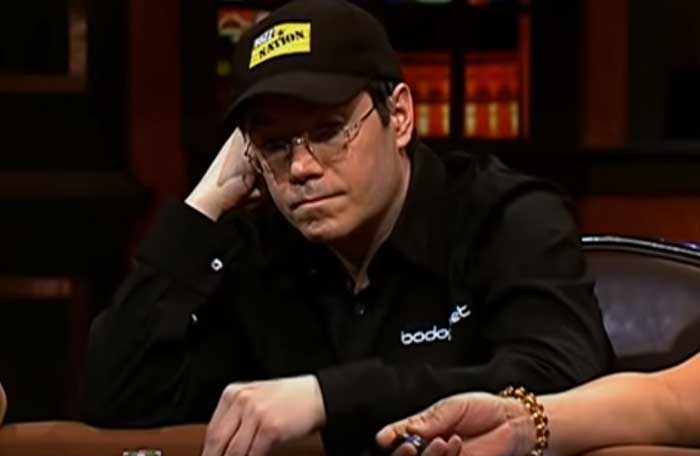
Talking of “larger than life,” there is probably no one out there who hasn’t heard of Jamie Gold, the 2006 Main Event winner.
A talent agent by profession, it was only a couple of years before 2006 that Gold seriously took up poker.
Jamie managed to secure his seat in the tournament through a deal with a gambling operator, so he was clearly very motivated to play but not motivated enough to put his own 10 grand on the line.
Poker skills aside, Gold definitely put up quite a show during his Main Event run.
Instead of trying to put up a poker face and “out-stare” his opponents, he kept on talking and talking every time he was involved in a hand.
Jamie was a real showman, which wasn’t that surprising given his background. What was surprising, though, was that his style was apparently working.
Somehow, he was able to talk his opponents into doing exactly what he wanted – call him when he had the goods and throw away their cards when he was bluffing.
Of course, luck had a lot to say in Gold’s 2006 victory, but his unorthodox style of play and the ability to confuse his opponents certainly played a significant role as well.
2007 – Jerry Yang
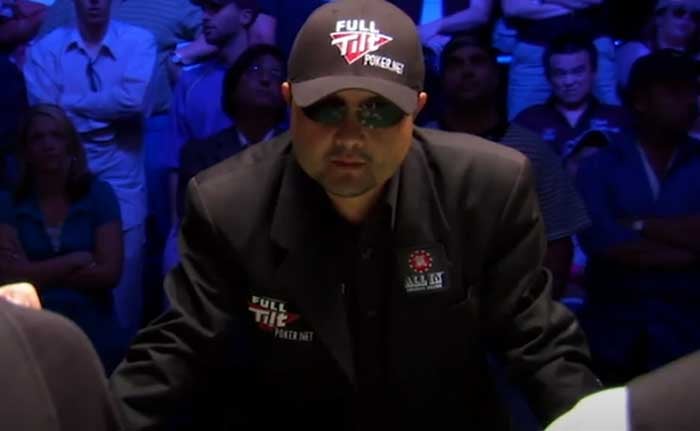
Of all WSOP winners over the years, recreational player Jerry Yang must be one of the most colorful personalities in the mix.
Much like Jamie Gold, he was a real presence on the felt. But, unlike Gold, Yang wasn’t trying to throw his opponents off or get reads on them.
His performance was marked by his firm belief that his run in the Main Event was his destiny.
He believed God was by his side, and he was very emotional all the way through. His sometimes excessive celebration after winning big pots could be excused as he wasn’t a hardened pro, and he was on the path to win a huge, truly life-changing amount of money.
While his demeanor wasn’t to everyone’s taste, Jerry Yang was a passionate player and an interesting one to watch. That’s a trait shared by quite a few winners, especially from the earlier period.
2008 – Peter Eastgate
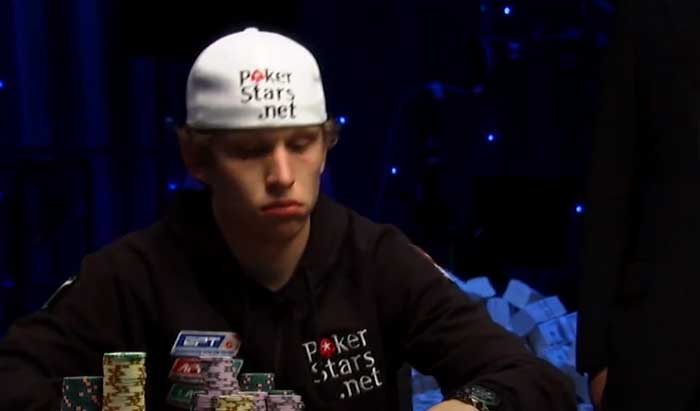
Born in 1985, Eastgate became the youngest-ever WSOP Main Event winner at the time. His profile was much different from all the winners preceding him, though, announcing perhaps a new poker era.
Eastgate was one of the young guns who decided to abandon the traditional career path and instead try to make living playing poker. He also qualified for the Main Event that year via an online poker room and arrived in Vegas as a part of the Ladbrokes team.
His win brought him $9.1 million and opened doors for many interesting and lucrative opportunities.
However, during the Main Event and in his later appearances, Eastgate never showed a great degree of passion or interest for the game. He wasn’t explicitly saying it, but he always had the aura of a man who was done with it.
Only a few years after the win, Eastgate confirmed these suspicions, announcing he was retiring from poker and even auctioned away his Main Event bracelet. Unlike most other champions who enjoyed the attention, Eastgate preferred to live his life away from the limelight.
These definitely aren’t common traits found in top-level professional poker players, but it only goes to show that the WSOP has seen many different types of winners over the years.
2009 – Joe Cada
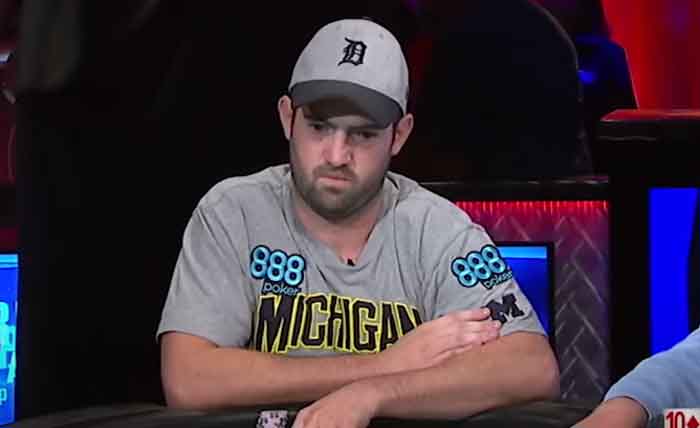
Eastgate’s record as the youngest-ever champion wasn’t long-lived. It was beaten the very next year when young Joe Cada went on to win the Main Event at the age of 21.
Cada was very serious about poker as he was playing for real money online even before he turned 18 and started playing live games in Canada when he turned 19.
Truly passionate about poker and determined to succeed, he built a successful career in the game. His Main Event victory was just one of many to follow in upcoming years.
Yet, he’s never seemed too fazed by the money. The 2009 win brought him $8.5 million, and over the years, he’s almost doubled that amount, but you could never guess this by his demeanor or lifestyle.
Quiet, composed, and always focused on the game, he’s one of those guys you might not even notice at the table. That is, until you get involved in a pot with them.
Despite his unassuming nature, Cada is very competitive and enjoys winning for the sake of winning, which is probably why he’s been able to stay on the grind for so long and not complain about any of it.
2010 – Jonathan Duhamel
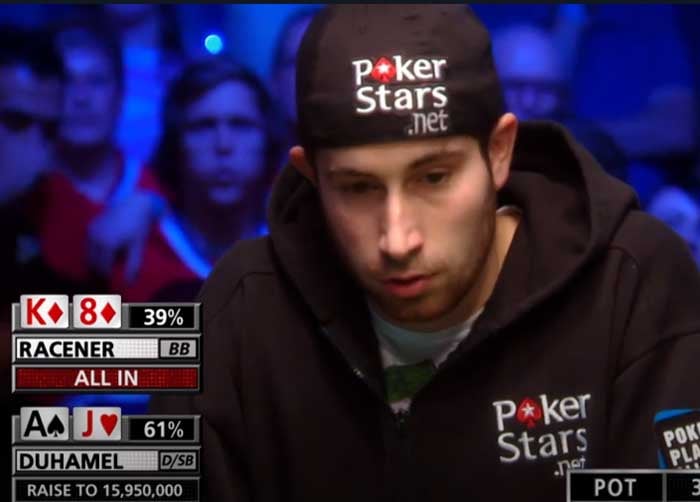
The first Canadian to win the Main Event, Jonathan Duhamel, was just a few months older than Cada when he claimed the title in 2010. He, too, decided to leave school and pursue the path of a professional poker player.
As far as his table demeanor and personality, he’s in the same boat with Eastgate and Cada.
He belongs to the generation of players who see poker in an entirely different way. He wasn’t playing for theatrics or fun – he was there to make money and be the best player he could in the game he fell in love with.
Duhamel won $8.9 million in 2010, but his live tournament earnings exceed $18 million. His Main Event success wasn’t a fluke, and his later results clearly show that.
Looking at these three, there seems to be a bit of a pattern. Young people determined to succeed and ready to do what it takes to get to the top have done quite well in poker over the years.
These are people who didn’t see poker as a fun pastime or just another casino game. They recognized it for what it was – a game of skill – and then invested the time and effort to systematically get better.
2011 – Pius Heinz

After reading previous paragraphs, you probably won’t be surprised to hear that the 2011 Main Event winner Pius Heinz was born in 1989. He, too, discovered poker at a very young age and started playing online.
In fact, Heinz has never been too much into live play. He barely made a few hundred thousand on the live circuit after his $8.7 million win in the Main Event.
He studied the game hard and brushed his skills online, and it wasn’t long before he was making a lot of money on the virtual felt.
It’s pretty clear that the German has never been interested in becoming famous. His Main Event victory probably opened many sponsorship opportunities, and he probably could have traveled the world to play tournaments left and right pretty much for free.
However, he chose not to.
Heinz went back to online poker and kept on grinding. He’s probably one of the least famous Main Event winners out there.
Unlike some others on the list, he clearly didn’t need to bolster his ego – being one of the best poker players was a confirmation enough.
2012 – Greg Merson
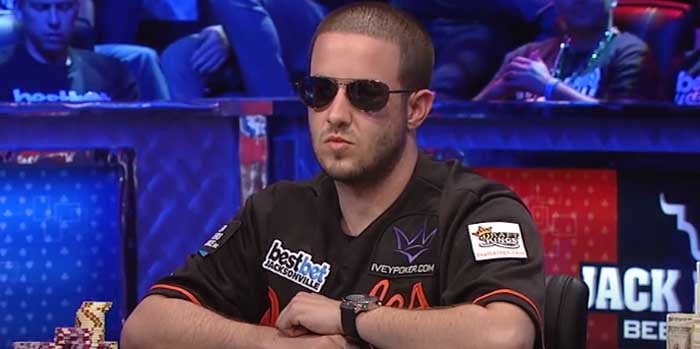
Merson’s story isn’t all that different from the few previous ones, at least as far as his poker endeavors are concerned.
He started young, playing six-max cash games online, honing his skills on the virtual felt, and playing in some live tournaments along the way.
However, Greg had to overcome a number of personal struggles on his way to the top.
For many years, he was struggling with a drug addiction, which was holding him back from realizing his full potential.
After some failed attempts, Merson finally overcame his addiction in December of 2011, just months before his Main Even triumph that brought him $8.5 million. Interestingly enough, he won another bracelet that year in the $10,000 Six-max Championship, good for another $1.1 million.
The fact that he was able to overcome many difficulties in such an epic fashion only shows that motivation and determination go a long way and can definitely play a huge role in one’s path to becoming a WSOP champion.
2013 – Ryan Riess

Ryan Riess is another young WSOP winner who took up poker as a career. Born in 1990, he had some experience and success on the live circuit but nothing that could prepare him for the big win that was about to come his way.
Riess didn’t quit his education to play, as he graduated from the Michigan State University, acquiring a hospitality business degree.
Although slightly more flamboyant than his young predecessors, Riess is another typical representative of the new wave of WSOP champions.
The money he made that year helped propel his career, and he’s stayed on the grind to this very day with a fair bit of success.
Apart from some interviews and appearances immediately following the win, Ryan Riess can hardly be called “famous” outside of poker circles. In fact, when trying to name all the Main Event winners, his name is on the list of candidates you’d likely forget.
This has nothing to do with Ryan’s ability to play poker, of course.
Like quite a few others “new” champions, he chose not to make a big deal out of it.
It seems like later Main Event winners weren’t as fascinated by the idea of being game ambassadors and preferred to stay away from the limelight.
2014 – Martin Jacobson

Talking of “quiet” WSOP champions, unless you’re a proper poker fan, you might not even know the name of Martin Jacobson.
The young Swede took down the 2014 Main Even for an impressive amount of $10 million, but there was hardly any fuss about it.
Jacobson started his career online as well, gradually moving up the stakes. Like the rest of the young guns, he used the advantages of the poker software and other available tools to improve his skills and results.
But Jacobson has never shown much interest in the fame and glory that came with winning the prestigious title.
He barely did any interviews immediately after and has pretty much disappeared from the public eye.
While some other names on this list had a similar approach, Martin really took it to the extreme.
It was for this reason that his name is barely ever mentioned in the context of WSOP winners, although the amount won is tied for the second-biggest Main Event prize, behind only Jamie Gold’s $12 million win in 2006.
2015 – Joe McKeehen

Born in 1991, Joe McKeehen belongs to the same category of Main Event winners described in the previous paragraphs. Young, motivated, and fascinated by the game, he started playing at a very early age, making his first online steps while still underage.
Before his Main Event triumph, McKeehen has already acquired a lot of experience on the live felt. He started playing live tournaments as soon as he turned 18, and just the year before, he came within inches of winning a bracelet, finishing runner-up in the 2014 Monster Stack event for $820,000.
Unlike many guys who would just come to play poker, McKeehen has always been a vocal presence at the tables, to say the least. He enjoys banter and “speech play” as much as anyone.
Although an common among those who came up playing online poker, he clearly made it work.
Not everyone is fascinated by Joe’s table antics, but the same can be said for any similar character, be it Jamie Gold or Will Kassouf. Like him or not, he’s entertaining to watch and adds flair to the games.
2016 – Qui Nguyen

After a series of Main Event winners from the new generation of players, Qui Nguyen broke the pattern in 2016.
Born in 1977 in Vietnam, Nguyen moved to the United States when he was 24, and he started playing poker in 2003, slowly graduating from low limit games to No-Limit Hold’em.
Nguyen is everything that all the young champions aren’t.
His love for gambling goes well beyond poker as he is a big fan of table games such as baccarat. He’s more of a professional gambler than a professional poker player.
Qui is a flamboyant character you’re definitely going to notice at the tables.
His Main Event performance was marked by his peculiar clothing style, especially his raccoon hat that fans simply fell in love with.
Add to this a very aggressive style that was more based on the feeling and willingness to gamble than on the game theory, and you get a proper old-school winner in 2016.
Nguyen wasn’t camera-shy, either.
He enjoyed giving interviews and even turned his Main Event experience into a book. He was very proud of his achievement and wanted the whole world to know about it.
2017 – Scott Blumstein
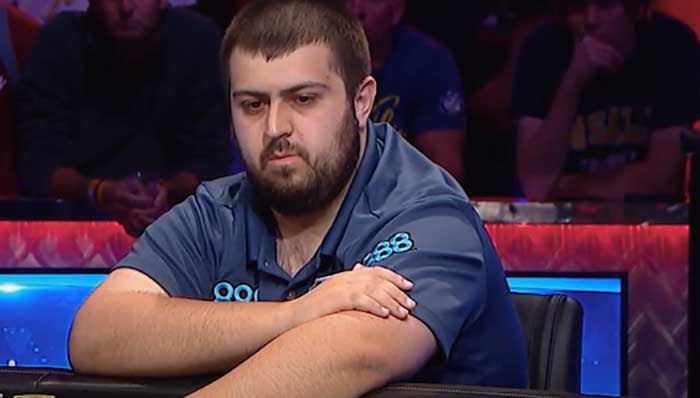
The 2016 Main Event was somewhat of disruption, but things got back on track in 2017. That year, the young American Scott Blumstein took home the title and $8.15 million for first place.
That win was by far the biggest in Blumstein’s career as his total live tournament earnings stand at around $8.6 million.
As far as his personality is concerned, Scott seems like a genuinely nice guy. Instead of excessive celebrations or taunting his opponents, he seemed to genuinely share their pain when they ended up on the losing end of an all-in.
This isn’t to say that he wasn’t happy about winning, but there was nothing striking about his performance in 2017. He was a genuine, humble winner, which can’t be said about too many poker players.
2018 – John Cynn
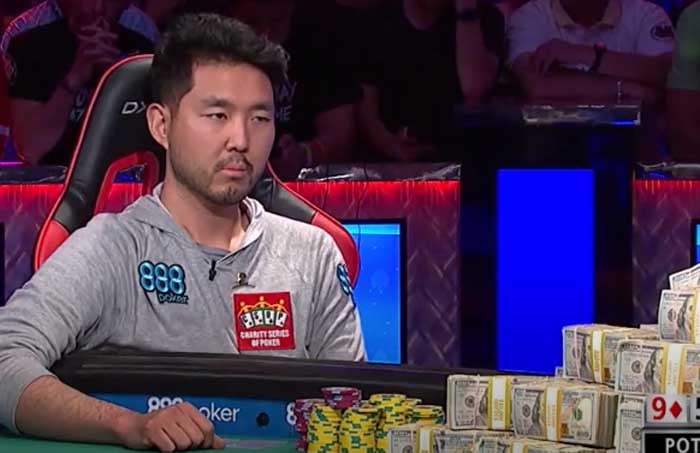
John Cynn found his way into poker after trying his hand at a traditional career. He worked as an IT consultant for a while but realized that he needed a change. Poker presented itself as an interesting alternative, and Cynn decided to take a chance.
That decision turned out to be a very good one, as he went on to win the 2018 Main Event to the tune of $8.8 million at the age of 34.
While this was a huge result for Cynn, his run through the tournament was remarkable in any non-poker sense. He was there to play poker, and he didn’t attract much attention to himself.
After his victory, he quickly got back to his regular life. He kept playing poker, of course, but he wasn’t actively trying to cash in on the title, nor was he looking to live the life of a poker superstar.
2019 – Hossein Ensan
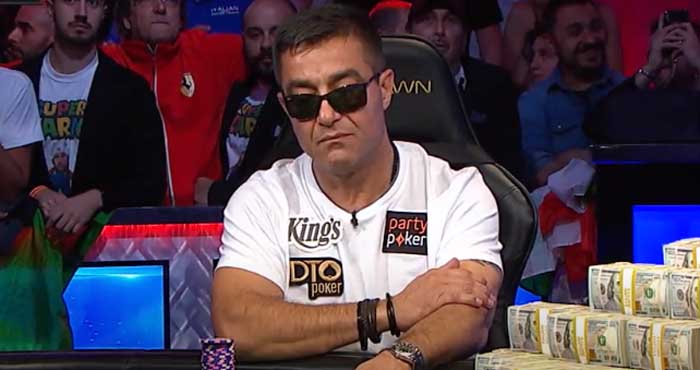
The 2019 WSOP champion Hossein Ensan definitely doesn’t belong to the new school of GTO players.
Born in 1984 in Iran, he moved to Germany in 1989. He had to build his life in a foreign country, starting with all sorts of jobs and eventually creating his own taxi company in 2003.
Unlike many on this list, Hossein Ensan didn’t find his fortune thanks to poker.
In fact, he fell in love with the game pretty late, when he was 39. Although he enjoys playing cards and has $13 million in live winnings ($10 million coming from the Main Event win), he could hardly be called a professional.
As for his personality, Hossein is a bit of an enigma. His style threw off everyone, even the hardened pros. He wasn’t playing what would be considered “good” poker by today’s standards, but his unorthodox approach somehow still worked.
Although not afraid to engage in the table banter and throw some jabs, Ensan strikes you as more of a withdrawn, silent type. He enjoyed every moment of the ride through the Main Event as he probably didn’t expect to win.
He’s more of an aspiring amateur in love with the game than anything else.
2020 – Damian Salas
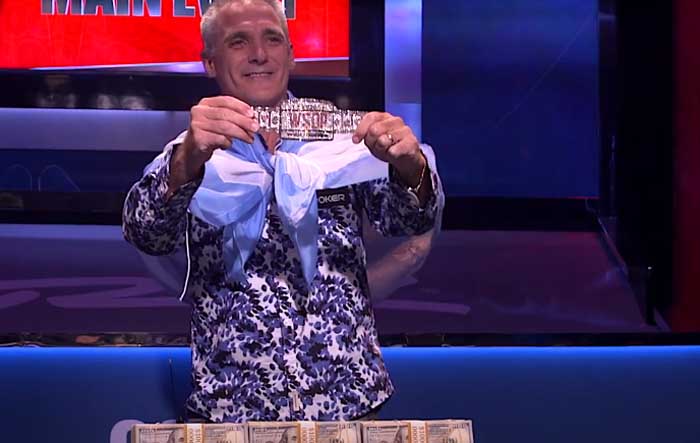
Damian Salas , the final name of this list of WSOP winners, is the first Argentinian poker player to win the Main Event.
The 1975-born lawyer has an impressive poker résumé, with great live and online results alike.
Unfortunately, due to the majority of the event taking place online and only the final table played live, we didn’t get to see much of Salas in action.
From what was shown, he seems like a fairly down-to-earth character despite his successful career.
Gracious in victory and defeat, he would be a good ambassador for the game if he wanted to take on that role.
Summary: Is There a Common Trait WSOP Champions Share?
After looking into all these Main Event winners over the years, can we find certain personality traits that all or most of them have in common?
Is there a characteristic that makes one player likelier to triumph on the greatest poker stage than the other?
There really doesn’t seem to be too much of a pattern. The World Series has seen winners from all age groups, experience levels, and backgrounds.
One thing that does stand out is that the biggest percentage of winners in recent years comes from the group of young, motivated players who took on poker in full capacity and entirely devoted themselves to the game.
Given that poker is the game of skill, it stands to reason that those willing to learn and improve have better odds of winning, even in a massive field such as the Main Event.
But, as Hossein Ensan and Qui Nguyen demonstrated, even in today’s day and age, anyone can still win.
All it takes is some luck in the right spots and the desire to win.
Whether you’ve got an OTT, loud personality or you’re more of the silent type, it doesn’t matter.
There is no way to predict who the next WSOP Main Event winner will be based on personality traits alone.
And that’s just one of the reasons poker is such a wonderful game!
Lead image: WSOP.com


